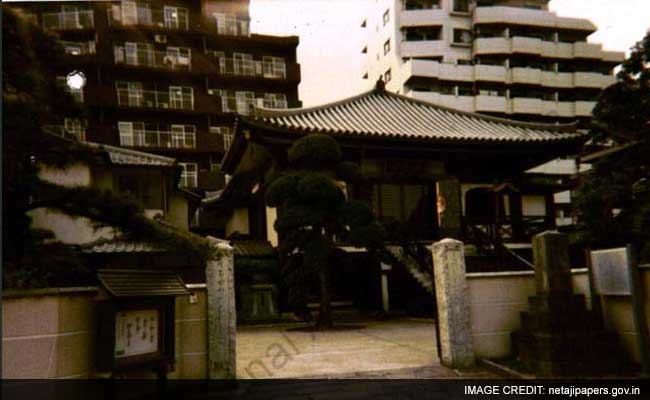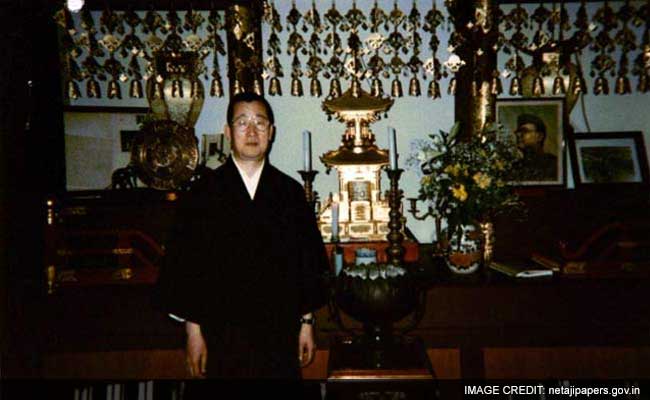
Taking the initiative to bring back his ashes "would not be advisable," the note said.
New Delhi:
Among the files on Subhas Chandra Bose, declassified by Prime Minister Narendra Modi in New Delhi this afternoon, is a 21-year-old cabinet note that said the government had already accepted that Netaji had died in a plane crash in August 1945. Those who held a different view "were guided more by sentimentality rather than by any rational consideration," it says.
The note, dated February 6, 1995, said despite the government accepting the plane crash theory on Netaji's death, taking the initiative to bring back his ashes "would not be advisable."
The cabinet secretariat's note titled "Netaji ashes in Tokyo" discussed a "proposal to bring the mortal remains of Netaji Subhas Chandra Bose from Japan to India." The freedom fighter's ashes were lying at the Bose institute in Japan, it said.
 In an interview to NDTV, Professor Sugata Bose, a direct relative of the freedom fighter and the Director of the Netaji Research bureau said, "The documents confirm what I have known for decades that Netaji's mortal end came in Taiepei on the 18th of August, 1945."
In an interview to NDTV, Professor Sugata Bose, a direct relative of the freedom fighter and the Director of the Netaji Research bureau said, "The documents confirm what I have known for decades that Netaji's mortal end came in Taiepei on the 18th of August, 1945."
Other members of the Bose family, which has been deeply divided over the fate of Netaji, disagree. According to Surya Bose, the truth over Netaji's death would become clear only once foreign intelligence files became available. According to Mr Bose, "It (the publication of files) is the beginning of chapter which will probably clear up the mystery of his disappearance or death."
The files that were declassified today say the Intelligence Bureau (IB) was not in favour of Netaji's ashes being brought back. A document says, "(The) IB's views are to the effect that it would not be advisable to take any initiative to bring the ashes to India as there is no demand from any quarter for this. If the ashes are brought to India, the people of West Bengal are likely to construe it as an imposition on them of the official version of Netajis death."
 In a letter to Prime Minister Narasimha Rao, the former Japanese Prime Minister Yoshiro Mori had written, "I presume that you are aware that ever since September 1945, his remains have been kept at Renkoji, a Buddhist temple in Tokyo, under the hospitable case rendered by its chief Priest."
In a letter to Prime Minister Narasimha Rao, the former Japanese Prime Minister Yoshiro Mori had written, "I presume that you are aware that ever since September 1945, his remains have been kept at Renkoji, a Buddhist temple in Tokyo, under the hospitable case rendered by its chief Priest."
Worried that the temple would be unable to indefinitely keep looking after the urn, the 1995 cabinet note said, "If no decision is taken by 1995, in which year the Bose Academy proposed to have the last memorial service, India may be asked by Renkoji temple to take charge of the urn containing the ashes whereby we may have no alternative but to store them in our Mission in Tokyo."
The documents also make it clear that India was paying the Renkoji temple for decades - "The Government of India was paying for the upkeep of the mortal remains in Renkoji Temple and the management could be persuaded to continue with this arrangement if the upkeep charges were increased," the note prepared under the PV Narasimha Rao government said.
Netaji's own daughter, Anita Bose Pfaff, a German economist, has said that only a DNA test can decisively prove that the ashes at Renkoji are those of Subhas Bose though other family members say a DNA test on a body that has been cremated by not result in accurate results.
The note, dated February 6, 1995, said despite the government accepting the plane crash theory on Netaji's death, taking the initiative to bring back his ashes "would not be advisable."
The cabinet secretariat's note titled "Netaji ashes in Tokyo" discussed a "proposal to bring the mortal remains of Netaji Subhas Chandra Bose from Japan to India." The freedom fighter's ashes were lying at the Bose institute in Japan, it said.

Netaji's remains have been kept at Renkoji, a Buddhist temple in Tokyo, the documents say.
Other members of the Bose family, which has been deeply divided over the fate of Netaji, disagree. According to Surya Bose, the truth over Netaji's death would become clear only once foreign intelligence files became available. According to Mr Bose, "It (the publication of files) is the beginning of chapter which will probably clear up the mystery of his disappearance or death."
The files that were declassified today say the Intelligence Bureau (IB) was not in favour of Netaji's ashes being brought back. A document says, "(The) IB's views are to the effect that it would not be advisable to take any initiative to bring the ashes to India as there is no demand from any quarter for this. If the ashes are brought to India, the people of West Bengal are likely to construe it as an imposition on them of the official version of Netajis death."

India was paying the Renkoji temple for decades for the upkeep of Netaji's remains, the documents say.
Worried that the temple would be unable to indefinitely keep looking after the urn, the 1995 cabinet note said, "If no decision is taken by 1995, in which year the Bose Academy proposed to have the last memorial service, India may be asked by Renkoji temple to take charge of the urn containing the ashes whereby we may have no alternative but to store them in our Mission in Tokyo."
The documents also make it clear that India was paying the Renkoji temple for decades - "The Government of India was paying for the upkeep of the mortal remains in Renkoji Temple and the management could be persuaded to continue with this arrangement if the upkeep charges were increased," the note prepared under the PV Narasimha Rao government said.
Netaji's own daughter, Anita Bose Pfaff, a German economist, has said that only a DNA test can decisively prove that the ashes at Renkoji are those of Subhas Bose though other family members say a DNA test on a body that has been cremated by not result in accurate results.
Track Latest News Live on NDTV.com and get news updates from India and around the world

